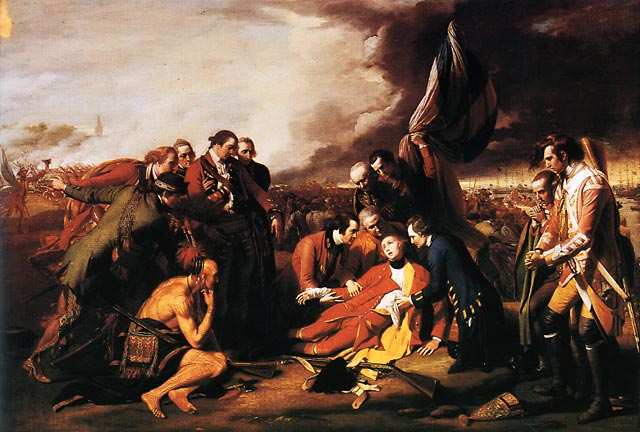September 13, 2007
Gratuitous Historickal Posting (TM)

Death of Wolfe by Benjamin West
Today is the anniversary of the Battle of the Plains of Abraham in 1759, in which the British forces besieging the French at Quebec staged a daring assault up a narrow path running from the clifftops to the St. Lawrence River, formed up on the plains above and defeated the French in battle before the walls of the city. A few days later, Quebec surrendered to the British.
The British were led by the dashing young commander Major General James Wolfe, the French by the seasoned Marquis de Montcalm. Both leaders were killed in the battle.
While hostilities in Canada did not end until the Marquis de Vaudreuil surrendered Montreal to three converging British armies in September 1760, and the Treaty of Paris officially ending the war was not concluded until 1763, the loss of Quebec essentially killed any French hope of maintaining their colonial possession.
As I always do when posting about the French & Indian War, without the knowledge of which one cannot possibly understand the events that were to engulf the American colonies a decade later, I make here a couple of book recommendations:
First, one absolutely must start with that incomperable giant among 19th Century historians, Francis Parkman. His Montcalm and Wolfe: The French and Indian War is part of a longer study of the entire history of Anglo-French struggle for North America, but is a good place to jump in. Then, go on to his The Conspiracy of Pontiac, the story of how the Brits (as we would say now) "won the war but lost the peace" by failing to squash the Indian uprising that occurred almost immediately after the sesession of European hostilities. (If you buy this volume, you also get Parkman's interesting account of his own travels on the frontier via the Oregon Trail.)
If you want a modern writer, I can't recommend too highly Fred Anderson. His Crucible of War: The Seven Years' War and the Fate of Empire in British North America 1754-1766 makes a terrific companion to Parkman's work, in that he folds in much more of the overall geopolitical situation. Having recently read it, I can also recommend his A People's Army: Massachusetts Soldiers and Society in the Seven Years' War for its exploration of what might be called the Colonial Mentality - one almost unknown and incomprehensible in London.
Finally, I'd again recommend Fintan O'Toole's White Savage: William Johnson and the Invention of America. Johnson doesn't make it into history very much these days, but in addition to becoming something of a military hero at the Battle of Lake George in 1755, he more importantly rose to become the Crown's most valuable Indian Agent in the Northern colonies. If you can get past the psycho-babble about his Irish roots giving him an inherent sympathy for the Indians, it's a remarkable story. (BTW, in West's painting above, I believe that is supposed to be Johnson in the green jacket and buckskins on the left, pointing behind himself.)
UPDATE: This is just the sort of thing I should be cross-posting over at The Dangerous and Daring Blog for Boys and Girls, but I can't find my @#(*$&# keys.
Posted by Robert at September 13, 2007 10:51 AM | TrackBackAbstract paintings
Angel painting
animal paintings
ballet paintings
beach painting
Boat painting
building painting
Children painting
Christ painting
church painting
City painting
Cottage painting
Dancer painting
field painting
Floral paintings
Garden painting
Hunting paintings
impressionist painting
Knight painting
Lady painting
Landscape painting
Lighthouse paintings
Music painting
Nude painting
Oriental paintings
Piano painting
Seascapes paintings
Still Life paintings
street painting
sunset painting
Tropical paintings
Venice paintings
Village painting
wine painting


 Image courtesy of the lovely and talented
Image courtesy of the lovely and talented 